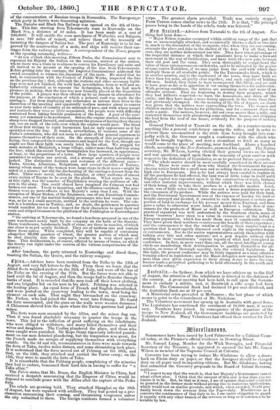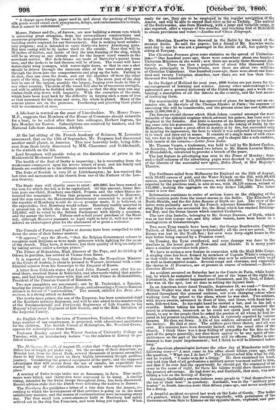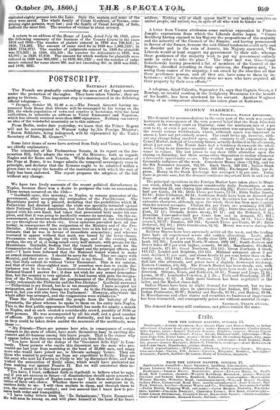311torrIlanron3.
Summonses have been issued by Lord Palmerston for a Cabinet Coun- cil today, at the Premier's official residence in Downing Street.
Mr. Samuel Laing, Member for the Wick Boroughs, and Financial Secretary of the Treasury, is appointed to succeed the late Mr. James Wilson as member of the Supreme Council at Calcutta.
Coventry has been trying to induce Mr. Gladstone to allow a draw- back on Excise-duty on paper, or that the foreigner should be charged duty on all paper used in importing ribbons. But Mr. Gladstone, having first submitted the Coventry proposals to the Board of Inland Revenue, replies—
"I regret to say that the result is, that her Majesty's Government cannot adopt either plan. I think that the amount of this evil is less than you es- timate it to be. But, be that as it may I sin of opinion that relief could not be granted in the former mode without giving rise to numerous applications, which would rest on similar grounds, and which, when awarded, would gra- dually break down the revenue from the Paper-duty. Mischievous as I conceive the continuance of that duty to be, I am under obligation to guard it equally with any other branch of the revenue so long as it continues to be leviable by law.
" A charge upon foreign paper used in and about the packing of foreign silk goods would entail such annoyances, delays, and embamssments to trade, that it cannot be entertained."
Messrs. Palmer and Co. of Jarrow, 'are now building a steam ram which is attracting great attention, from her extraordinary constructions and enormous proportions. The vessel is the iron-plated rain frigate.Defiance, building under contract for our Government. She is making most satisfac- tory progress ; and is intended to carry thirty-six heavy Armstrong guns. Her iron casing will be 4i inches thick on the outside. Next that will be 20 inches of timber, and inside of that the iron framing of the ship, which will be as strong as any already used for the largest sized vessels in the merchant service. Her deck-beams are made of Butterby's patent beam iron, and the decks to be laid thereon will be of iron. The vessel-will have water-tight wing passages, with water-tight doors, so that in case a shot -should be driven through the immense sides of the vessel men may pass through the doors into the compartments and plug up the hole. Failing to do that, they can close the doors, and cut the chamber off 'from the other parts of the ship, keeping the water within it. The stern post of the ship will be one of the largest, possibly the largest, forging ever made in this or ' any other country. The stem of the vessel will also be of enormous strength, and will in addition be fortified with plating, so that the ship may run any timber-built ship down with impunity. With the exception of the ends, which have been kept back by the difficulty in forging such a mass of iron as that necessary for the stem and stern, the whole is plated. Many of the armour plates are on the premises. Feathering and grooving those plates will be commenced at once.
A life-boat is wanted on the coast of Lincolnshire. Mr. Henry Pease, M.P., suggests that Members of the House of Commons should subscribe for a boat, to be called after their late colleague, Herbert Ingram, the late Member for Boston. Subscriptions are received by bankers, and the National Life-boat Association, Adelphi.
At the last sitting of the French Academy of Sciences, M. Leverrier announced, that on the 15th of September, Mr. Ferguson bad discovered another small planet, in America. This new heavenly body, being diffe- rent from those lately discovered by MM. Chaeornac and Goldsehmidt, is the sixtieth on the list.
Lord Brougham will preside today at the distribution of prizes in the Huddersfield Mechanics' Institute.
The health of the Earl of Derby is improving ; he is recovering from the weaknesses consequent upon his severe attack of gout, and his family and friends are confident as to his ultimate restoration to health.
The Duke of Norfolk is very ill at Littlehampton; he has received the last rites and sacraments of his church from one of the Fathers of the Lon- don Oratory.
The Stade dues will shortly cease to exist: 460,000/. has been named as the sum for which the toll is to be capitalized. Of this amount, Great Bri- tain pays one-third, Hamburg one-third, Prussia and the other States in- terested the remainder. When this .proposal was submitted to Hanover, and the sum named, the Hanoverian Government consented to accept it if the republic of Hamburg would do so—a promise made, it is believed, in the expectation that Hamburg-would refuse. Hamburg readily assented-to a roposision in which she sees her account very clearly. Our share of 153,000/. will be voted by the British Parliament with hardly a question, and the sooner the better. .Fifteen-and-a-half years' purchase of the Stade toll, although Hanover possesses no legal right to levy it, will not be con- sidered an extravagant price for the abatement of so great a nuisance.
The Consuls of Parma and Naples at Ancona have been compelled to take down the arms of their former masters.
"It appears," says the Monde, "that the Belgian Government refuses to recognize such Belgians as were made prisoners while fighting for the cause of the church. They have, it declares, lost their quality of Belgian subjects by taking service under a foreign prince.
The Prince of Hohenlohe, High Almoner of the Pope, and Archbishop of Odessa in partibus, has arrived at Vienna from Rome.
It is reported at Vienna that Prince Petrulla, the Neapolitan Minister at the Court of Austria, is about to proceed to Warsaw, intrusted with a con- fidential mission from his Sovereign to the Emperor of Russia.
A letter from Coblentz states that Lord John Runlet, soon after his ar- rival there, received Baron de Schleinitz, and afterwards visited that gentle- mant and had long conferences witlr him and with Prince de Hohenzollern, President of the Prussian Council of Ministers.
Two new pamphlets are announced ; one by M. Trubetskoi, a Russian, bearing the strange title of,LaRussie Rouge, and advocating a Franco-Russian alliance in favour of " nationalities." The second, entitled Les _Deux An- flexions, is a strong attack on Austria.
The newly-born prince, the son of the Emperor, has been nominated chief of the Kurinski infantry Regiment, and will be also added to the mnster-rolls of the Preobraschenski and Pawlowski Regiments of Life Guards, to his Majesty's Cuirassier Regiment of Life Guards, and to the Rifle Battalion of the Imperial Family.
An English church in the town of Tammerfors, Finland, where there isa large number of our countrymen, is projected, with educational auxiliaries for the children. The British Consul at Helsingfors, Mr. Woodfall Crowe, appeals for subscriptions from home.
Professor Beasley opened the Winter Session of University College on Tuesday, with an introductory lecture " ou the relation of history to po- litical science."
The Melbourne herald, of August 25, states that "the exploration expe- dition has at length got under way. On the occasion of their departure, on Monday last, from the Royal Park, several thousands of persons assembled there to bid them God speed on their highly interesting though perilous journey. Considering the general equipment of the party, and the supposed advantages that will accrue from the use of camels, no expedition has started in any of the Australian colonies under more favourable aus- pices."
A mutiny of Swiss troops broke out at Semarang, in Java. Nine muti- neers were killed, and thirty-five were sentenced to be hung. A similar rising, intended by the Swiss troops throughout Java, has been discovered. Recent advices state that the Dutch were defeating the natives in Borneo.
The Northern Bee publishes a letter of a late date from the Amor, ac- cording to which the development of that province is going on in the most satisfactory manner, and the means of communication were increasing-every day. The four small iron screw-steamers built at Hamburg had safely arrived out in the ship San Francisco, and were being put together. When ready for use, they are to be employed in the regular navigation of the Amoor, and will be able to ascend that river as far as Tschita. The aijr-ga Of the Steinwarder, also frorn/Iamburg, with a-large and valuable cargo, le also reported, after a voyage Of five months, and touching first at HakoZit-di to obtain provisions and water.."=.Loadon and7China Telegraph.
Mr. Sheridan. Knowles was drowned ie the Baltic by the wreck of the steamer Arctic. So said the papers ; but a friend of Mr. Knowles wrete next day to say he was not a passenger in the Arctic at 'all, but quietly 're- siding at Torquay.
The Christian Freeman gives some statistics on the spread of Unitarian- ism—" One hundred years ago, there were somewhere about one hundred Unitarian Ministers in the world ; now there are nearly three thousand dis- tinctly so. There was then a population of about fifty thousand Uni- tarians, principally in Transylvania now there are about two millions of Christian Unitarians. One-hundretlyears ago, -there were about-one hun- dred and twenty Unitarian ehurches,-now there are not less than three thousand five hundred." . - In the Budget of Holland for next year, 4000 florins are put down for the encouragement of teething and science. Among other undertakings to be patronized are a.general-dictionary of the Dutch languege, and a work eon- tabling; a description of 811,,the insects in, the, country, and the best means of destroying them.
The municipality of Madrid has approved of plans for laying out an ex- tensive site, in the style of the Champs Elysaes at Paris; the expense of executing this will be considerable, and the ground alonelas cost 4,000,000 reels (1,000,000 fr.). The famous crystal throne which Shah Jehan counted amongst the most valuable of thesplendid trophies which_adorned his palace, has been sent to England in the Saladin. But little isknowm of its history prior to its hav- ing come into his possession. Subsequently, . on the taking of Delhi. by the Mahrattas, they made a great effort to destroy it by .fire, but succeeded only in injuring its appearance, the heat to which it was subjected having caused it to crack and open out in seams. It consists of a single mass of rock crys- tal, two feet in height by four in diameter, and is shaped like a sofa cushion, with tassels at the corners.—Letter from India. Mr. Thomas Vseper, a tradesman, was held to bail by Sir Robert Card'en, on Saturday, for having addressed two letters to Mr. Simon Lazarus-Miers, of Houudsditch, calculated to,provoke a breach of the peace.
The last feature in advertising was seen in the Times of Monday i four- and-a-half columns of the advertising pages were devoted -to a publication of the libretto of the -successful new opera, Robin Rood, at Her Majesty's Theatre.
The Swiftsnre sailed from Melbourne for England on the 11th of Auguit, with 70,623 ounces of gold, and the Water Nymph on the 23d, with 80,453 ounces, making together 151,076 ounces -worth 604,0001. The Red Jacket, reported by the previous, mail, is also aesea, with 38,129 ounces, valued .at 152,0001., making the -aggregate on the may hither 756,500/. 'The latter vessel is now due.
Information continues to arrive a -aerious, losses on the shipping of the North-eastern ports from the recent storms in-the Baltic. -TheElizeheth of North Shields, and, the Sir John.Rennie of Blyth are lost. The crew of the latter were.gallantly eared by the French. schooner Emmeline. Two mis- sing Blyth vessels are accounted for, the-Mead which has reached Bridling- ton Bay, andthe Ocean Queen which reached Cuxhaven.
The new ship Isabella, belonging to Mr. George Dawson, of Blytb, which -was on her first voyage out, and fifty other vessels, have heal burnt in a conflagration at Constantinople.
Two more Tyne vessels have been lost ; the George Donthwaite, Captain Tatlock, at Revel, on her voyage to Cronstadt ; all the crew are saved. The Emma was lost in 'the North Sea;' her crew were forty-eight hours in the tops before being rescued by a Prussian vessel.
On Tuesday, -the Tyne overflowed, and some' damage was done to the dwellers in the lowes ,parts ofNewcastle and :Shields. It is many years since a similar occurrence took place.
We have to notice-a new.feature in connexion, with the Hull Rifle Corps. A singing class.has been .ffinned.by inembeneof Captain White's company, so that while on the march the battalion may now be enlivened with vocal as well as instrunaentabnumie. • Several songs 'and choruses, and especially the chorus in II. Trovatore, are at present in .course of rehearsal.—:Eastcrn Counties Herald.
An accident occurred on Saturday last to the Comte de Paris, while hunt- ing, by which he sustained a fracture of one of the bones of the right -leg. Fortunately, the accident happened near Claremont, and Dr. hod, of Esher, who was on the spot, lost no time in setting the injured limb.
In an American letter dated Truxillo, September 18, we-read—" General William Walker was shot on the 12th instant, at eight o'clock a.ans He showed throughout the -greatest coolness, not even changing colour when walking from the prison 'to the plaza, where he was shot. Two soldiers, with drawn swords,• advanced in front of him,. and three, -with fixed bayo- nets, followed him. . In his right hand he carried a hat, and -in his:left- a crucifix. Before taking his seat -on the fatalecaquete, he requested the priest in attendance, inasmuch as he could not speak loud enough to be beard, i to say to the people thatshe.asked the:pardon-of all, whom he.had in- jured n his present eapeffitiora,,fees -which is variously repotted by Tatham .persons. liethensat,daatit. ,A file of ten soldiers advanced and fired on the instant. He died at once. 'The soldiers gave three cheers, -and-all was over. His remains bave been decently buried, with the usual rites of-the church. I think 'there Was ifileen feeling of sympathy for -his fate on the part of the people generally; nor does there appear to be any spirit of-vin- dictiveness on the part of the Government and its officers. Radler is con- demned to four years imprisonment ; but I think he will-beliberatedhefore long."
.Ap American phrenologist lecturer the other day at Manchester told the ,following story—" A man came to his office. about fifteen-years ago, with the question, Wbat,can.I de.best ?" The,lecturer asked him what he did, and be replied, " I make soap for He then examined his bead, and told him that of.all professions a military career was most suited to him, and that if he ever had the opportunity be should get the command of an army in the cause of right, for there 'his talents would shew themselves to the greatest advantage. He had done so, and Garibaldi, that man, was now telling a tale on the destiny of Fairope. Certainly Garibaldi's renown induces some people to "fool themselves to the top of their bent " in quackery. Garibaldi, was in the " military pro- fession" in South Aracrictsmore than fifteen years ago, and never maticsoap for a living.
A dreadful accident occurred last week oil the-Lake of Gatda. • The boiler of a gunboat,- which has 'been running 'regelerly, with permission Orthe Goeernment frofirBila to-Lirnone on the oppositeehore, exploded,' and pre-
. _
erew were saved. The whole family of Conk Gueerien,-of.Veni. Verona cons- united people; and uniteditoofin spite,of all who wish to hinder us." prising eight persons, were lost ; and the faitilly of Count Arright, or Salo,
suffered the same fate. The number of victims is about seventy. _
A return to an address of the House Dards, dated July 30, 1860, gives the following summary of the business of the County Courts in the years 1858 and 1859—The number of plaints" entered' in 1858 was 738;854; in 1859, 714,562. The amount of -gams sued for in 1858 was 1,908,2191; in 1859. 1754,9711. -The number of judgments entered in 1858 for plaintiffs was 375,952; in 1859, 424,550 ; the number for defendants in 1858, was 13,992 ; in 1859, 17,950. The amount for which verdicts for plaintiffs were entered in 1858 was-965;5331. • in 1859,851,732/. • and the number of judg- ments entered for sums above'20/. and not exceeding 501. in 18.58 was 4968 ; and 1859, 3631.




























 Previous page
Previous page